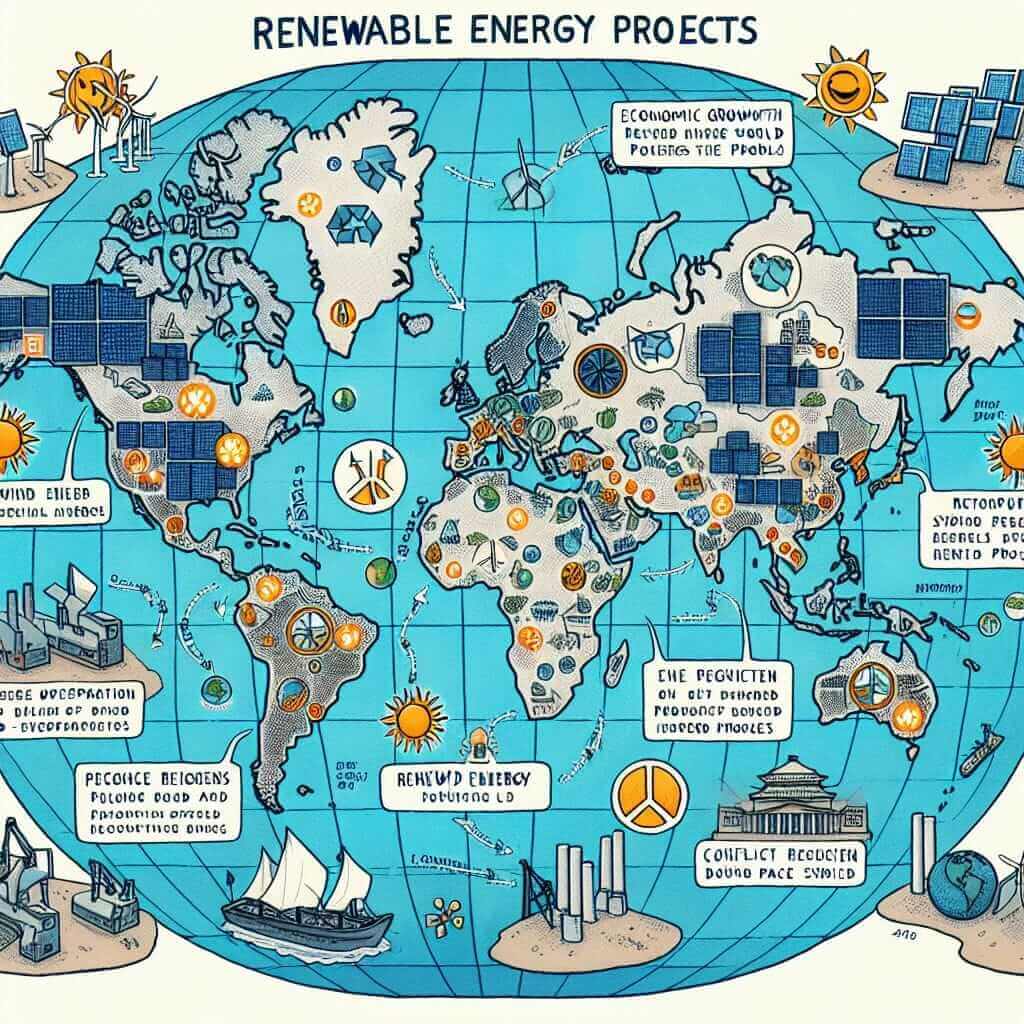The IELTS Reading section is a cornerstone of the examination, gauging your capacity to comprehend and analyze English texts. One prominent topic that has often sparked interest in IELTS is the impact of renewable energy adoption on the geopolitical landscape. Given the rising global focus on renewable energy, there’s a likelihood of encountering such themes in future IELTS examinations.
Analyzing the popularity of renewable energy, the environmental and economic implications, and its potential influence on geopolitical dynamics, this article will provide you with a well-crafted reading exercise. We aim to deliver content akin to actual IELTS exams, ensuring you can practice efficiently and boost your reading skills.
IELTS Practice Test: Renewable Energy’s Geopolitical Impact
Reading Passage
The Geopolitical Implications of Renewable Energy
As the global energy landscape transitions towards renewable sources, there is a considerable impact on geopolitical dynamics. Historically, geopolitical power has been intrinsically linked to control over fossil fuels. Countries with abundant oil and gas reserves have wielded significant economic and political influence. However, the shift to renewable energy sources such as wind, solar, and hydroelectric power is altering this traditional power distribution.
Renewable energy sources are more evenly distributed across the globe compared to fossil fuels. This shift allows more countries to become energy independent, reducing their reliance on oil and gas imports. For instance, nations like Germany and China are investing heavily in renewable technologies, significantly reducing their energy import needs and enhancing their energy security.
Moreover, the adoption of renewable energy reduces the occurrences of conflicts arising from fossil fuel resource control. Fossil fuels have historically been a primary cause of international conflicts and economic sanctions. With declining dependence on these resources, there is a potential for a more stable geopolitical climate.
Investing in renewable energy also stimulates economic growth within countries. It creates jobs in manufacturing, installation, and maintenance of renewable energy systems. Additionally, it helps diversify economies that were previously dependent on fossil fuel revenues. For example, countries in the Middle East, known for their oil reserves, are increasingly investing in solar energy projects to diversify their economies.
Furthermore, the technological advances associated with renewable energy drive global cooperation. Innovations in energy storage, grid infrastructure, and energy efficiency require collaboration across borders, fostering international partnerships.
However, the transition to renewable energy is not without challenges. It requires substantial investment and technological know-how, which can exacerbate inequalities between developed and developing nations. Wealthier countries have the means to invest in renewables, while poorer nations may struggle to keep pace, potentially creating a new form of energy divide.
In conclusion, while the move towards renewable energy is reshaping the geopolitical landscape with potential for enhanced global cooperation and reduced conflicts, it also presents notable challenges that must be addressed to ensure an equitable energy future.
Questions
Multiple Choice
-
Which of the following best describes the main idea of the passage?
a. The economic benefits of renewable energy.
b. The challenges of adopting renewable energy.
c. The geopolitical impact of transitioning to renewable energy.
d. Technological advances in renewable energy. -
What is one effect of renewable energy on global conflicts?
a. Increased conflicts over land.
b. Reduction in conflicts over fossil fuels.
c. New conflicts over renewable resources.
d. Decreased innovation in energy technology.
True/False/Not Given
-
Countries rich in fossil fuels are not investing in renewable energy.
-
Renewable energy adoption enhances energy security by reducing dependency on imports.
Matching Information
-
Match the following impacts with their causes mentioned in the passage:
- Creation of jobs ____
- Enhanced global cooperation ____
- Economic diversification ____
Answer Keys
-
c. The geopolitical impact of transitioning to renewable energy.
Explanation: The passage discusses how the shift from fossil fuels to renewable energy is impacting geopolitical power distribution, international conflicts, and economic diversification. -
b. Reduction in conflicts over fossil fuels.
Explanation: The passage suggests that fewer conflicts will arise from the control of fossil fuel resources as nations reduce their dependency on them through renewable energy adoption. -
False
Explanation: The passage mentions that even fossil fuel-rich countries like those in the Middle East are investing in renewable energy. -
True
Explanation: The passage clearly states that renewable energy promotes energy independence and security by reducing reliance on oil and gas imports. -
- Creation of jobs: Investing in renewable energy
- Enhanced global cooperation: Technological advances associated with renewable energy
- Economic diversification: Countries investing in projects like solar energy
Common Mistakes
- Misinterpreting the Main Idea: Ensure to grasp the primary focus of the passage, which might not be directly stated in the introduction or conclusion.
- Assuming Information: Rely only on the passage and avoid inserting prior knowledge or assumptions.
- Handling Complex Vocabulary: Use context clues within the passage to understand unfamiliar terms rather than skipping them.
Vocabulary
- Geopolitical (adj): /ˌdʒiː.oʊ.pəˈlɪtɪ.kəl/ – relating to politics, especially international relations, as influenced by geographical factors.
- Fossil Fuels (n): /ˈfɒs.əl ˌfjʊəlz/ – energy sources formed from the remains of ancient plants and animals, like coal and oil.
- Renewable Energy (n): /rɪˈnjuːə.bəl ˈen.ə.dʒi/ – energy from sources that are naturally replenishing like wind, solar, and hydroelectric power.
Grammar Point
- Complex Sentences: Often used in academic writing to show relationships between ideas.
Example: Countries that invest in renewable energy systems tend to diversify their economies, which were previously dependent on fossil fuel revenues.
Conclusion
To excel in the IELTS Reading section, constant practice with realistic test passages is crucial. Understanding how renewable energy impacts the geopolitical landscape is a relevant and timely topic, possibly appearing in future tests. Focus on identifying main ideas, deciphering complex sentences, and expanding your vocabulary. With dedicated practice, you can achieve a high score in your IELTS Reading section.
plaintext
